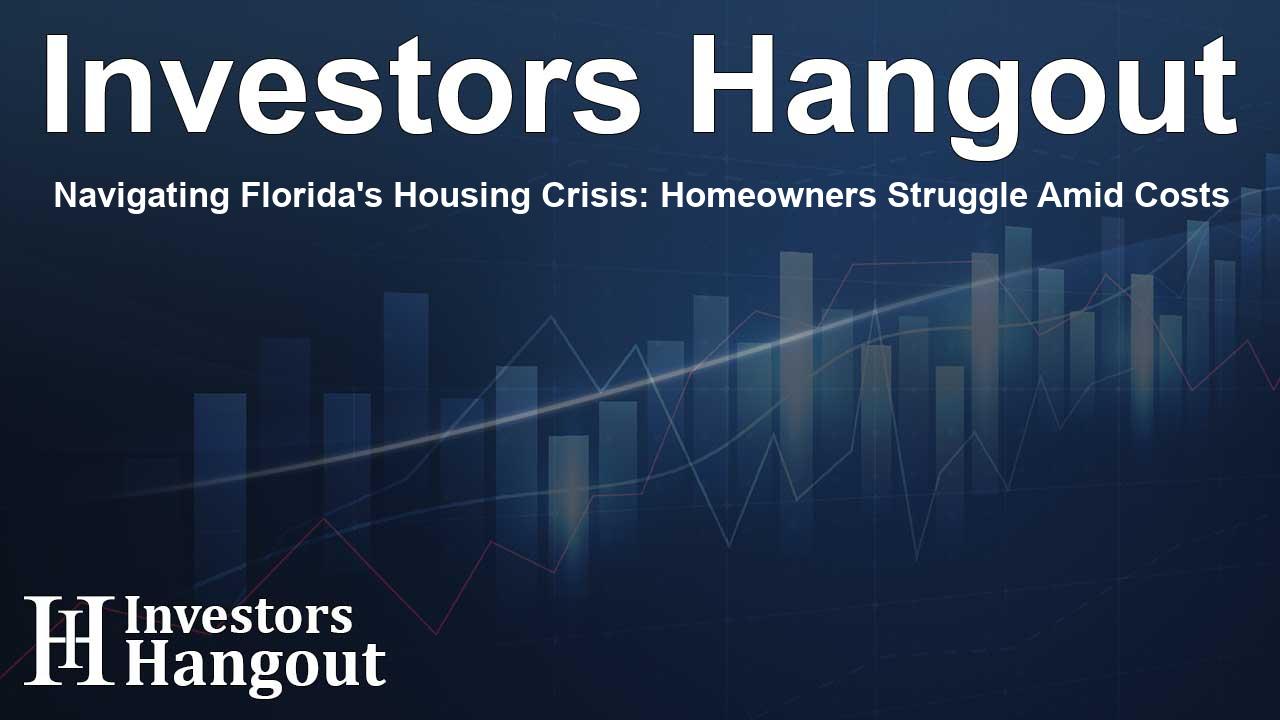Navigating Florida's Housing Crisis: Homeowners Struggle Amid Costs

Florida's Housing Market in Crisis
Many thought they would find paradise in Florida, but for some, the dream has turned into a nightmare. Homeowners like Anthony Holmes are grappling with the harsh realities of a dwindling housing market. After relocating from Virginia in 2021 and buying a five-bedroom house in a gated community, Holmes believed he made a wise investment. However, selling the home has proven more difficult than he ever anticipated.
Market Downturn Effects
Fast forward to the present, and Holmes is left with a property that he can't unload. Despite lowering the listing price from $620,000 to $583,900, he has received no offers. This sentiment echoes throughout Florida, as once-booming housing markets witness significant slowdowns. Reports from Parcl Labs show a concerning 50% increase in housing inventory in cities like Tampa and Orlando, with demand dropping by at least 10%.
The Influencing Factors
This downturn is attributed to a combination of factors, including soaring mortgage rates and skyrocketing insurance costs. Recent hurricanes, such as Hurricane Helene, have only exacerbated these issues, with Hurricane Milton approaching and prompting state emergency declarations. Florida Governor has urged residents to brace for possible evacuations.
The Insurance Crisis
Steep increases in insurance premiums are driving homeowners away. For instance, many Floridians are facing premiums that have skyrocketed by up to 400%. The Insurance Information Institute explains that frequent natural disasters lead insurers to pass added costs onto homeowners. Holmes, who once paid $1,700 annually for insurance, now finds himself dishing out more than double after his insurer dropped him following Hurricane Idalia.
A Shift in Buyer Dynamics
The real estate climate in Florida has shifted dramatically, with desperate sellers emerging from a once-proud buyer’s market. Experts like Brad O’Connor of Florida Realtors anticipate a potential housing correction. The dynamics have changed so significantly that even the once-flourishing condo market is on shaky ground.
Impact on Condominiums
Following the Surfside condo collapse in 2021, Florida enforced stricter building inspection laws, leading to costly repairs. Residents are often hit with special assessments that can reach hundreds of thousands of dollars. For example, at the Cricket Club condominium in North Miami, two-bedroom units valued above $450,000 are now selling for as little as $200,000 due to such assessments.
Investor Activity on the Decline
As the market faces mounting pressures, institutional investors who once bought properties in bulk are now offloading their holdings. Reports indicate that nearly 5% of home listings in cities like Tampa, Orlando, and Jacksonville come from these sellers aiming to cash out before the market deteriorates further. Jason Lewris of Parcl Labs cautions that institutional investors' exit could lead to rapid price declines across the market.
Some Areas Resilient
Despite the gloomy outlook for much of Florida, certain areas, particularly Miami, still show resilience. The influx of wealthy buyers, many utilizing cash purchases, has helped stabilize this market. However, northern parts of Florida remain uncertain, particularly for homeowners like Holmes, who face challenges with high prices, elevated mortgage rates, and excessive insurance costs.
Conclusion
With storms on the horizon and no offers in sight, many homeowners find themselves caught in a perfect storm. As they struggle to break even, the broader implications of high costs and declining real estate values loom large over Florida's once-thriving housing market. The impact on individuals and families trying to find their footing amidst these changes is profound and resonates throughout the communities.
Frequently Asked Questions
What is causing the decline in Florida's housing market?
The decline is mainly due to high mortgage rates, increasing insurance costs, and the threat of hurricanes impacting home sales.
How have insurance costs affected homeowners?
Insurance premiums have surged by up to 400%, leading many to reconsider homeownership in Florida and placing additional financial burden on current owners.
Are investors still purchasing properties in Florida?
Investor activity has decreased as institutional investors begin to offload properties, indicating a potential downturn in the market.
Can some areas of Florida stabilize despite the overall market downturn?
Yes, areas like Miami are experiencing stability thanks to wealthy cash buyers, while other regions suffer under the weight of high costs and low buyer demand.
What might happen to property prices moving forward?
Experts warn of potential price deterioration in certain areas, signaling a significant correction in Florida's housing market.
About Investors Hangout
Investors Hangout is a leading online stock forum for financial discussion and learning, offering a wide range of free tools and resources. It draws in traders of all levels, who exchange market knowledge, investigate trading tactics, and keep an eye on industry developments in real time. Featuring financial articles, stock message boards, quotes, charts, company profiles, and live news updates. Through cooperative learning and a wealth of informational resources, it helps users from novices creating their first portfolios to experts honing their techniques. Join Investors Hangout today: https://investorshangout.com/
Disclaimer: The content of this article is solely for general informational purposes only; it does not represent legal, financial, or investment advice. Investors Hangout does not offer financial advice; the author is not a licensed financial advisor. Consult a qualified advisor before making any financial or investment decisions based on this article. The author's interpretation of publicly available data shapes the opinions presented here; as a result, they should not be taken as advice to purchase, sell, or hold any securities mentioned or any other investments. The author does not guarantee the accuracy, completeness, or timeliness of any material, providing it "as is." Information and market conditions may change; past performance is not indicative of future outcomes. If any of the material offered here is inaccurate, please contact us for corrections.